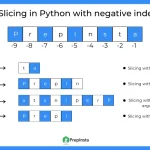Slicing with Negative Numbers in Python

Slicing in Python with Negative Indexes
Slicing with Negative Numbers in Python is a subpart of slicing in python. Slicing is used to iterate through the sequential or iterable data-type in the python programming language.
Slicing with Negative Numbers in Python
In this Section, we will look at the slicing on some iterable or sequential data-types like:
- List
- String
- Tuple
When we use a negative number as the start or stop index in a slice, it counts from the end of the sequence with -1 representing the last element, -2 representing the second to last element and so on.

Python code for Slicing with Negative Indexes
Slicing in String with Negative Indexes
The string is a data-type belongs to sequence data-type category. Slicing in the string is used to iterate through the elements. We have negative as well as negative indexes of any iterable data-type. In the below python code we will be iterating through negative indexes of the string elements.
#Initialize the String String = 'PrepInsta' #Slicing using 1 negative index arr = String[-2:] print(arr) #Slicing using 1 negative index arr = String[:-3] print(arr) #Slicing using 3rd negative index arr = String[::-1] print(arr) #Slicing using 2 negative indexes arr = String[-9:-4] print(arr)
Output:
ta
PrepIn
atsnIperP
PrepI
Slicing in List with Negative Indexes
The list is a data-type in Python programming language. Slicing is an iterable data-type and so we can perform some slicing operations on the string. Slicing is done using indexes of the iterable. Here we will iterate through the list using the negative indexes.
#Initialize the String String = ['P', 'r', 'e', 'p', 'I', 'n', 's', 't', 'a'] #Slicing using 1 negative index arr = String[-2:] print(arr) #Slicing using 1 negative index arr = String[:-3] print(arr) #Slicing using 3rd negative index arr = String[::-1] print(arr) #Slicing using 2 negative indexes arr = String[-9:-4] print(arr)
Output:
['t', 'a']
['P', 'r', 'e', 'p', 'I', 'n']
['a', 't', 's', 'n', 'I', 'p', 'e', 'r', 'P']
['P', 'r', 'e', 'p', 'I']
Slicing in Tuple with Negative Indexes
Tuple data type is sequential data-type in python programming. A tuple is an immutable data-type. But we can perform many operations on the tuple. As it is an iterable data-type we can perform some slicing functions on the tuple. Let’s have a look at the python codes for slicing on the tuple.
#Initialize the String String = tuple(['P', 'r', 'e', 'p', 'I', 'n', 's', 't', 'a']) #Slicing using 1 negative index arr = String[-2:] print(arr) #Slicing using 1 negative index arr = String[:-3] print(arr) #Slicing using 3rd negative index arr = String[::-1] print(arr) #Slicing using 2 negative indexes arr = String[-9:-4] print(arr)
Output:
('t', 'a')
('P', 'r', 'e', 'p', 'I', 'n')
('a', 't', 's', 'n', 'I', 'p', 'e', 'r', 'P')
('P', 'r', 'e', 'p', 'I')
Prime Course Trailer
Related Banners
Get PrepInsta Prime & get Access to all 200+ courses offered by PrepInsta in One Subscription
Get over 200+ course One Subscription
Courses like AI/ML, Cloud Computing, Ethical Hacking, C, C++, Java, Python, DSA (All Languages), Competitive Coding (All Languages), TCS, Infosys, Wipro, Amazon, DBMS, SQL and others






Login/Signup to comment